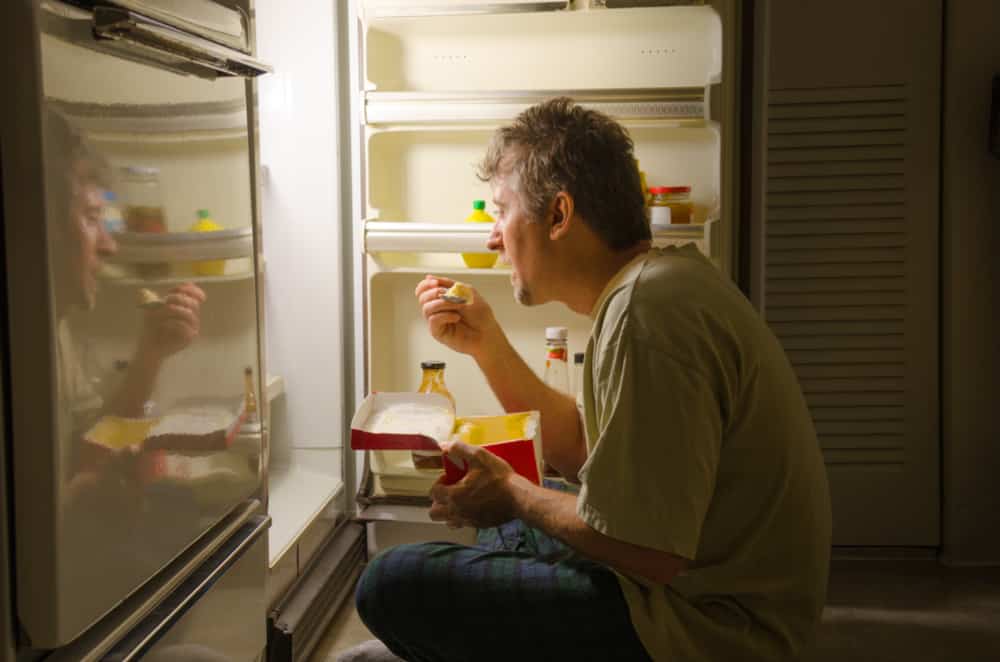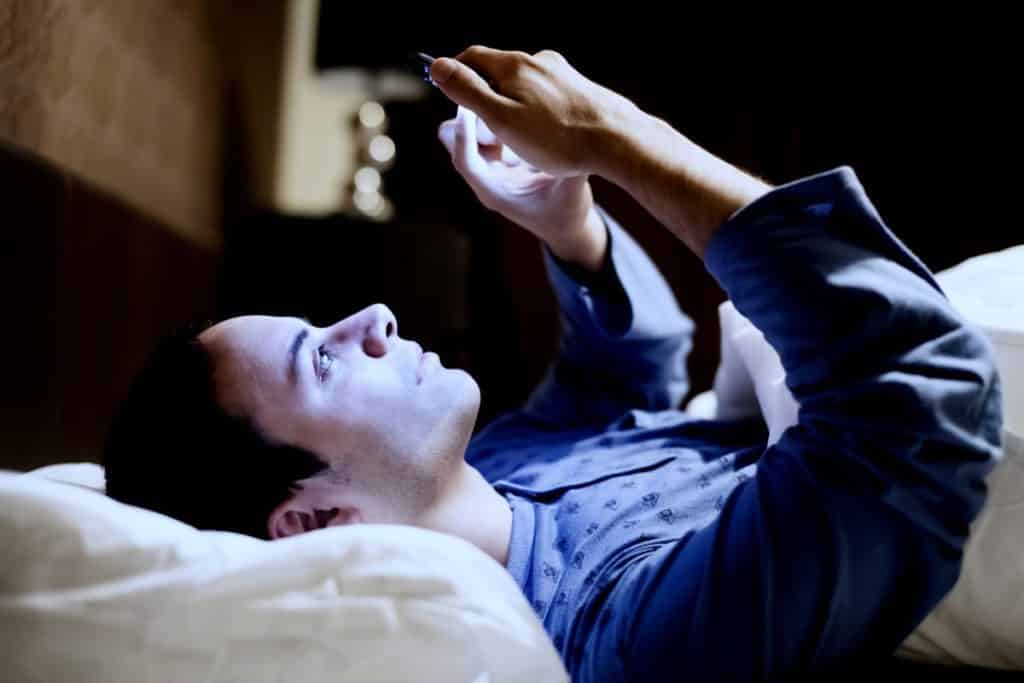If you’re on a mission to lose weight, you’re likely focused on nutrition and fitness. But what about sleep? Turns out, there’s an important relationship between sleep and weight loss.
I analyzed the latest research and spoke with doctors to understand the full picture. Keep reading to learn more.
Research shows that poor sleep is significantly associated with a reduced success of weight loss. When you aren’t getting enough sleep, you’re more likely to snack and less likely to exercise.
How Sleep Affects Weight Loss
When it comes to weight loss, getting enough sleep is as important as diet and exercise — even if researchers haven’t fully puzzled out why.
Dr. Kent Sasse, a MBSAQIP-accredited bariatric surgeon, says, “Most experts agree that, while the mechanisms and the hormonal chemistry are not yet fully understood, sleeping with poor quality or not enough hours both are associated with weight gain and difficulty losing weight,”
Here’s what we know.
Sleep Deprivation and Appetite
Too many late nights and early mornings add up. To get yourself going in the morning, you may indulge in a sugary latte or skip breakfast altogether. By dinner time, you may be too tired to cook, so you order in. And of course, you skip the workout because you’re just too tired for exercise. It’s a recipe for weight gain — and it’s pretty common.
A 2023 Gallup poll found that 20% of Americans report five hours of sleep or less at night, a fact that could be exacerbating the obesity epidemic.
“Sleep deprivation has been associated with increased snacking and more ‘giving in’ to temptations like extra dessert,” says Sasse, and research backs him up.
According to a 2009 study, people who don’t get enough sleep are more likely to eat more snacks, though not meals. A more recent study found that sleep-deprived participants were more likely to indulge in “highly palatable, rewarding snacks” like cookies, chips and candy, even after eating a balanced meal just two hours before. The study also found that the effects of sleep loss on appetite were strongest in the late afternoon and early evening.

It’s not just adults who tend to overeat when they don’t get enough sleep. In children and adolescents, Sasse says, sleep deprivation is associated with a reduction in a child’s ability to self-regulate appetite and avoid poor eating patterns, including overeating. They’re also more likely to have unhealthy food cravings. Other research points to a link between healthy eating habits and a reduction in sleep difficulties in children.
Sleep and Metabolism
One of the issues with insufficient sleep is the metabolic response.
“Sleep disturbance appears to reduce metabolism, lowering the body’s calorie expenditure,” says Sasse. Sleep deprivation is also related to a spike in cortisol, the stress hormone, and elevated cortisol levels are associated with weight gain.
Then there’s the fact that a lack of shuteye affects your body’s ability to process insulin, which is what the body uses to convert sugars and starches into energy. When the body can’t properly manage insulin, weight gain is a common side effect.
Sleep and Physical Activity
Sasse says that sleep deprivation negatively impacts physical activity.
“Some of the best research comes from the science of athletic performance, in which a long history of such investigations demonstrate reduced sports performance after sleep deprivation, with specific negative effects on cardiovascular, pulmonary, endocrine, central nervous system, and immunological systems,” he says.

When To Stop Eating Before Bed for Weight Loss
According to Sasse, there’s no universal time at which everyone should stop eating before bed. But he adds that his weight loss center has long advised establishing a routine that avoids late-night eating.
“Usually that means finishing dinner and avoiding further foods, alcohol, or caffeine after about 7:30 p.m. and then getting to bed relatively early, by nine or ten in most cases,” he says.
Since eating a meal too close to bedtime can make it hard to fall asleep, choosing an appropriate cut-off time from food really depends on your personal schedule.
“Studies consistently show that we have better health, performance, and weight when we get eight hours of sleep at night, so that’s what we should all shoot for,” notes Sasse.
The best approach is to work backwards from your rise time by eight hours to identify a reasonable bedtime, then plan to stop eating about three hours before then. That gives the body plenty of time to digest your meal and avoid issues falling asleep.
How to Improve Your Sleep
Avoiding meals too close to bedtime is one component of sleep hygiene, a series of habits designed to make it easier to fall and stay asleep. In the interest of improving the quality of your sleep, regardless of any weight loss goals, here’s what to keep in mind.
Create the Perfect Sleep Environment
Your bedroom should be designed to promote sleep. From the mattress to the bedding, the temperature to the amount of light, be mindful of creating a soothing sanctuary that makes it easy to drift off. Focus on keeping it dark, cool, and quiet.

Experts recommend keeping distractions to a minimum, which often means reserving the bedroom for sleep and sex only. Consider a white noise machine if you can’t manage exterior noise, and use blackout shades or a sleep mask to keep the room as dark as possible.
Stick to a Routine
A regular bedtime is an important part of sleep hygiene because it supports a healthy circadian rhythm. And by following a consistent bedtime routine, you can signal to the body that it’s time to wind down for sleep.
Begin your routine an hour or so before bedtime, and repeat the same tasks in the same order, such as washing your face, brushing your teeth, and unwinding with a few bedtime yoga poses or meditation.
Limit Blue Light Exposure
Blue light is emitted from devices like your smartphone, computer, or TV. It’s been shown to stimulate the brain and increase feelings of alertness, which is exactly what you need to avoid before bed. That’s why experts advise avoiding blue light exposure by keeping electronics out of the bedroom.

Avoid Alcohol and Caffeine
Both caffeine and alcohol can be detrimental to the body’s circadian rhythm and are best avoided at least a few hours before bedtime. Both substances can interfere with your ability to fall and stay asleep.
FAQs
Can weight loss affect sleep?
Yes. Losing weight translates to better sleep quality, particularly for those with sleep apnea. Multiple studies link weight loss with a reduction in sleep apnea, improving sleep quality.
How many hours of sleep for weight loss?
For adults, aim for at least seven to nine hours of sleep every night.
What is a realistic amount of weight to lose in 30 days?
Generally, it’s realistic to expect to lose one or two lbs a week. But Dr. Sasse says that a realistic amount of weight loss in 30 days really depends on where you start. If you’re over 300 lbs, it’s not unheard of to lose 10 or 20 lbs, or even more weight in the first 30 days. The important thing, he says, is to make changes that feel sustainable so the weight doesn’t come back.
Citations
Sasse, Kent. Personal interview. August 2025.
1. Qi L, Heianza Y, Li X, Sacks FM, Bray GA. Toward Precision Weight-Loss Dietary Interventions: Findings from the POUNDS Lost Trial. Nutrients. 2023 Aug 21;15(16):3665. doi: 10.3390/nu15163665. PMID: 37630855; PMCID: PMC10458797.
2. Nedeltcheva AV, Kilkus JM, Imperial J, Kasza K, Schoeller DA, Penev PD. Sleep curtailment is accompanied by increased intake of calories from snacks. Am J Clin Nutr. 2009 Jan;89(1):126-33. doi: 10.3945/ajcn.2008.26574. Epub 2008 Dec 3. PMID: 19056602; PMCID: PMC2615460.
3. Erin C. Hanlon, Esra Tasali, Rachel Leproult, Kara L. Stuhr, Elizabeth Doncheck, Harriet de Wit, Cecilia J. Hillard, Eve Van Cauter, Sleep Restriction Enhances the Daily Rhythm of Circulating Levels of Endocannabinoid 2-Arachidonoylglycerol, Sleep, Volume 39, Issue 3, March 2016, Pages 653–664, https://doi.org/10.5665/sleep.5546
4. Kracht CL, Chaput JP, Martin CK, Champagne CM, Katzmarzyk PT, Staiano AE. Associations of Sleep with Food Cravings, Diet, and Obesity in Adolescence. Nutrients. 2019 Nov 30;11(12):2899. doi: 10.3390/nu11122899. PMID: 31801259; PMCID: PMC6950738.
5. Zhao Y, Qu D, Liang K, Bao R, Chen S. Eating habits matter for sleep difficulties in children and adolescents: A cross-sectional study. Front Pediatr. 2023 Jun 12;11:1108031. doi: 10.3389/fped.2023.1108031. PMID: 37377761; PMCID: PMC10292748.
6. Jackson, S.E., Kirschbaum, C. and Steptoe, A. (2017), Hair cortisol and adiposity in a population-based sample of 2,527 men and women aged 54 to 87 years. Obesity, 25: 539-544. https://doi.org/10.1002/oby.21733
7. Charest J, Grandner MA. Sleep and Athletic Performance: Impacts on Physical Performance, Mental Performance, Injury Risk and Recovery, and Mental Health. Sleep Med Clin. 2020 Mar;15(1):41-57. doi: 10.1016/j.jsmc.2019.11.005. PMID: 32005349; PMCID: PMC9960533.


